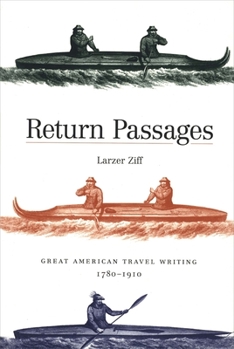Return Passages: Great American Travel Writing, 1780-1910
Select Format
Select Condition 
Book Overview
In this arresting book, Larzer Ziff traces the history of distinctively American travel writing through the stories of five great representatives. John Ledyard (1752-1789) sailed with Captain Cook, walked across the Russian empire, and attempted to find a transcontinental route across North America. John Lloyd Stephens (1805-1852), who today is recognized as the father of Maya archaeology, uncovered hundreds of ruins in two expeditions to the Yucatan and Central America, and he also was one of the first Americans to reach the Arabia Petrae. Bayard Taylor (1825-1878) invented travel writing as a profession. The only writer on Commodore Perry's expedition to Japan, he traveled also to Europe, Africa, India, and the Arctic Circle solely for the purpose of producing books about these journeys. Finally, in Mark Twain's unabashed concentration on the haps and mishaps of the tourist and Henry James's strikingly different cosmopolitan accounts of European sites and societies, travel writing conclusively emerged as great art. Ziff explains the ways in which the American background of these writers informed their impressions of foreign scenes and shows how America served always as the final object of the critical scrutiny they brought to bear on other people and their lands.
Format:Paperback
Language:English
ISBN:0300191553
ISBN13:9780300191554
Release Date:December 2000
Publisher:Yale University Press
Length:320 Pages
Weight:1.04 lbs.
Dimensions:0.7" x 6.0" x 9.0"
Customer Reviews
1 rating
Sharp and thoughtful
Published by Thriftbooks.com User , 22 years ago
Any lover of travel writing will surely love this account of how it developed as a genre in America. Ziff lays out a compact, clearly structured exploration of five American travel writers and their individual impact on American literature and overseas travel.Ziff had to clue me in to the fact that travel writing has been the steady number 2 selling genre (after the bible) in this country since colonial times. I also didn't know anything about Ledyard, Taylor, and Stephens, and found their adventures fascinating.Like many, I knew quite a bit about Twain's life and his travels, but his life was so rich that it was helpful to examine his later years solely through a more narrow travel-writing lens, as Ziff does. Twain's dilemna reads all too clear: he hated to be away from Hartford, but he couldn't afford the upkeep on his mansion there, so he had to move his family to cheap, 19th-century Europe. Significantly, it was the rivers of Germany that got him thinking of his riverboat days and eventually inspired him to write Life on the Mississippi. But even as he was reminiscing about his American source material, he couldn't return: the bulk of his much-needed money came not from his fiction but from his travel books, dispatches, and especially from his international lecturing; so when he had reached a good age to settle into a thoughtful retirement, he was forced to go on a punishing global book tour. I omitted to read the section on Henry James because I personally think he's an overated blowhard, but that's my poison. The four sections on Ledyard, Stephans, Taylor, and Twain made this short work more than worth my time. So, if you've never raced home from work just to pick up any book published by Yale University Press, try this one.





